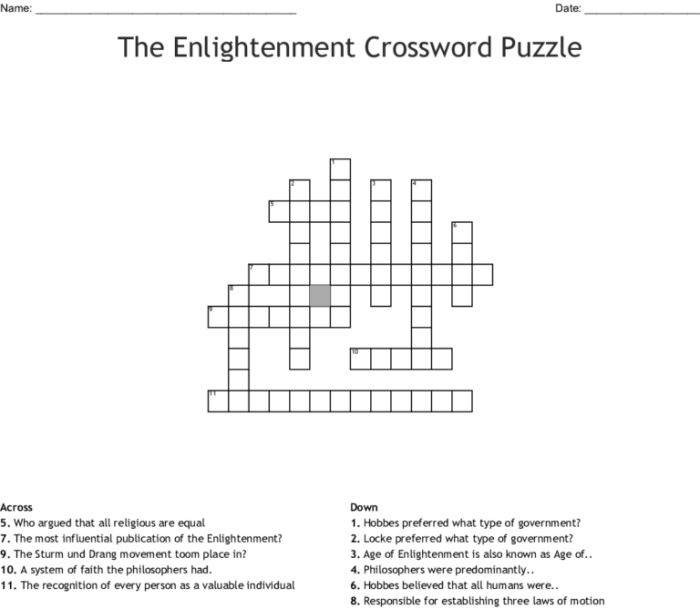Embark on an intellectual journey with our comprehensive Age of Enlightenment Crossword Puzzle Answer Key, a definitive guide to unlocking the profound ideas and enduring impact of this transformative era. Immerse yourself in the historical context, key figures, and groundbreaking principles that shaped Western civilization, all while engaging in a stimulating crossword puzzle experience.
From the rise of reason to the decline of traditional authority, the Enlightenment ignited a revolution in thought and society. Our answer key delves into the major themes and events that characterized this period, providing a deeper understanding of its lasting influence on modern thought and institutions.
Age of Enlightenment Overview

The Age of Enlightenment, also known as the Age of Reason, was a philosophical and intellectual movement that emerged in Europe during the 18th century. It was a period of profound change in Western thought and culture, marked by a shift away from traditional beliefs and institutions towards reason, logic, and scientific inquiry.
Key figures of the Enlightenment included Isaac Newton, John Locke, Voltaire, and Immanuel Kant. Their contributions to science, philosophy, and politics laid the foundation for modern thought and society.
Major ideas and principles that emerged during this period included the importance of individual reason and liberty, the separation of church and state, and the belief in progress and human perfectibility.
Impact on Intellectual Thought, Age of enlightenment crossword puzzle answer key
The Enlightenment had a profound impact on intellectual thought, emphasizing the power of reason and logic over superstition and tradition. It led to a shift from a reliance on religious dogma to a belief in the ability of human reason to understand the natural world.
Philosophers such as John Locke and David Hume developed theories of knowledge and morality based on empirical observation and rational thought. The scientific method, pioneered by Isaac Newton, became the standard for investigating the natural world.
These ideas had a transformative effect on literature and art, leading to the rise of realism and the decline of religious themes in favor of secular and humanistic subjects.
Social and Political Changes
The Enlightenment also brought about significant social and political changes. The rise of new political ideologies, such as liberalism and republicanism, challenged traditional notions of monarchy and divine right.
Enlightenment thinkers advocated for individual rights, equality before the law, and the separation of powers. These ideas influenced the American Revolution and the French Revolution, leading to the establishment of democratic governments and the decline of absolute monarchies.
The Enlightenment also had a profound impact on education, with a shift towards secular and scientific curricula and the establishment of new universities and academies.
Legacy and Influence
The Age of Enlightenment left a lasting legacy on Western civilization. Its ideas continue to shape modern thought and institutions, from the principles of democracy and human rights to the emphasis on scientific inquiry and rational thinking.
Enlightenment principles are reflected in contemporary society in areas such as education, law, and politics. The belief in progress and human perfectibility remains a driving force behind scientific and technological advancements.
The Age of Enlightenment was a pivotal period in human history, marking a shift towards reason, individualism, and a belief in the power of human knowledge.
FAQ Section: Age Of Enlightenment Crossword Puzzle Answer Key
What is the Age of Enlightenment?
The Age of Enlightenment was an intellectual and philosophical movement that emphasized reason, logic, and scientific inquiry, leading to significant changes in intellectual, social, and political spheres.
Who were some key figures of the Enlightenment?
Prominent figures of the Enlightenment include Isaac Newton, Voltaire, John Locke, and Immanuel Kant, among others, who made groundbreaking contributions to science, philosophy, and political thought.
What were the major ideas of the Enlightenment?
Central ideas of the Enlightenment included the belief in human reason, the importance of individual rights, the separation of church and state, and the pursuit of progress through scientific knowledge.